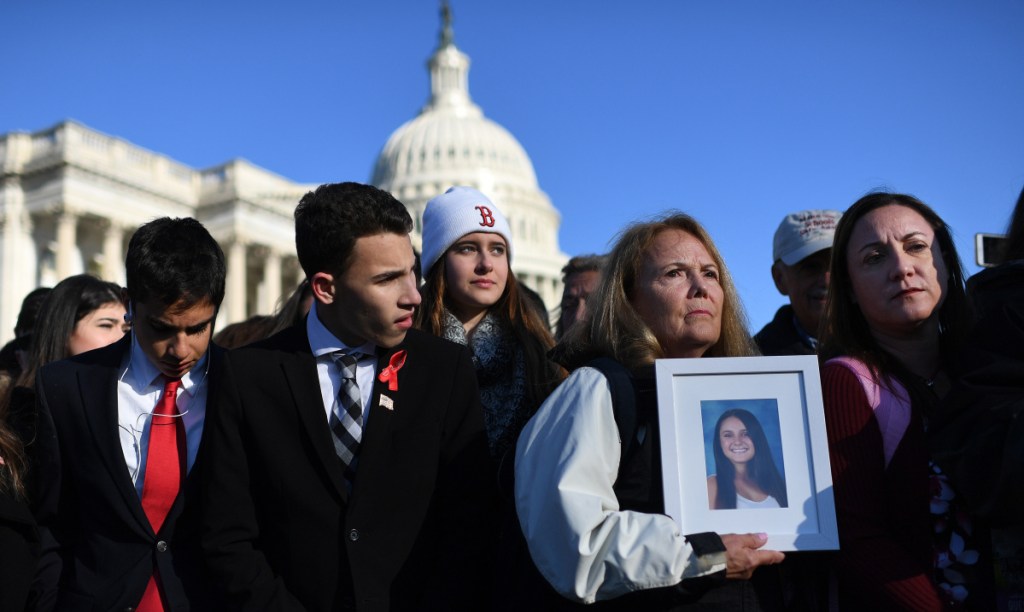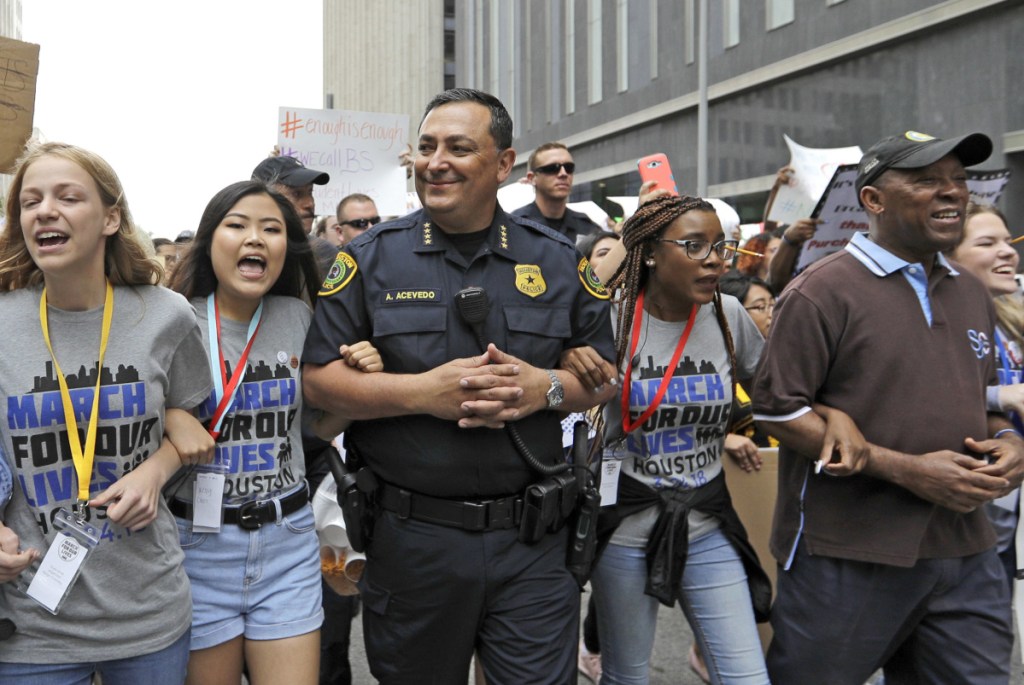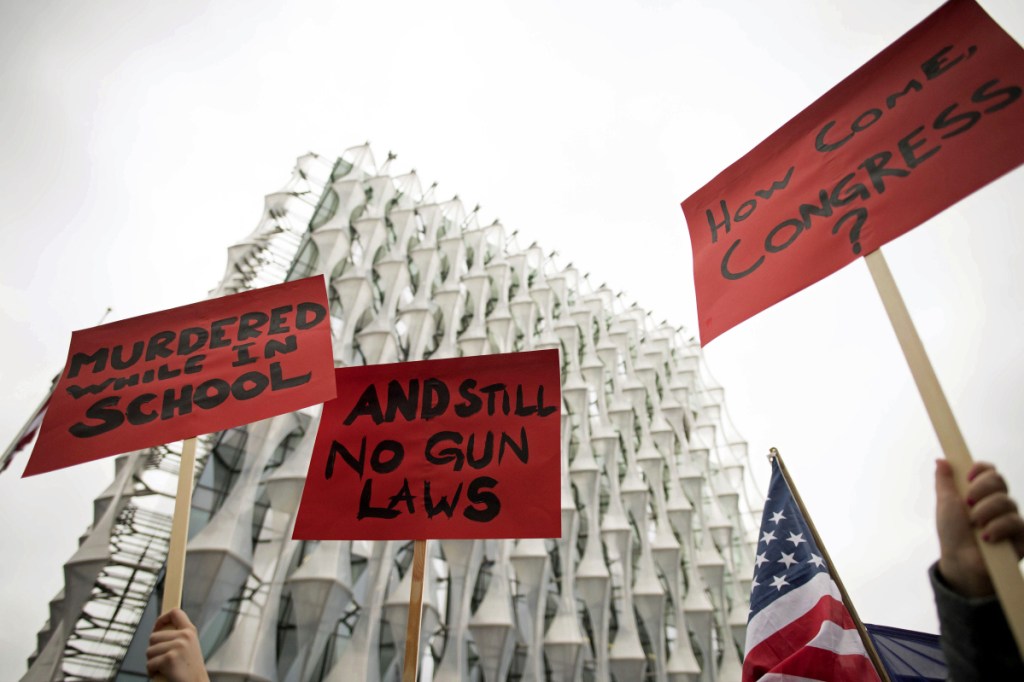Demonstrators around the world demanded action on gun violence Saturday, a massive display spurred by a shooting at a Florida high school last month that left 17 people dead.
Protesters from Los Angeles to London marched, held signs and chanted during “sibling marches” of the March for Our Lives rally, which drew an enormous crowd of protesters to the nation’s capital.
More than 800 events were happening worldwide, according to the gun-control group Everytown for Gun Safety. Counterprotests and separate rallies organized by gun rights groups were also taking place.
In New York, a sea of gun-control demonstrators stretched for about 20 blocks. In Boston, throngs of people jammed Boston Common. In Columbus, Ga., hundreds protested downtown. People gathered outside city hall in Las Vegas, where a gunman killed 58 people at a country music festival last year. A march was also planned in Jonesboro, Arkansas, on the 20th anniversary of a shooting at a middle school there that left four students and a teacher dead.
And in Parkland, Florida, where the shooting that became the catalyst for the marches took place at Marjory Stoneman Douglas High School, Anishka Milleret pushed a wheelchair through the grass and up and down the small hillocks at Pine Trail Park to make sure her children were present at the city’s rally.
Her daughters, Dianna and Deanna Milleret, are 16-year-old twins, both sophomores at Stoneman Douglas. Deanna’s cerebral palsy requires her to be in a wheelchair much of the time. It was rough going on the park’s bumpy turf Saturday, but that didn’t stop them.
“They both have memories of that day, and they’re both dealing with it in their own ways,” Milleret said.
Along with the trauma of being in school during the shooting, the Millerets had the added anxiety of not being able to locate Deanna for hours afterward. She was evacuated along with hundreds of other students to a nearby hotel, but it took her mother hours to get to her.
“I’m hoping things can get back to normal at some point,” Milleret said. “I think they will. I hope so.”
Groups gathered outside the U.S. Embassies in Copenhagen, London and Stockholm; in London they shouted “gun control now.”
In Tokyo, people gathered at Shibuya Crossing, holding signs with the names of people killed in mass shootings. In Frankfurt, a group walked down a street shouting, “No guns in our schools.” In Sydney, a group of children held posters.
Iris Diaz, a student at Stoneman Douglas, is on a long-planned trip to the Czech Republic. But she still planned to march.
“She’s with friends from school, and they’re going to march on Saturday down the streets of Prague,” said her mother, Audrey Diaz.
Josephina Davis, a 15-year-old from Boston, was 7 when her brother, Johnny, was shot and killed. Davis, who boarded a bus to Washington at midnight, said she is protesting “to support other people who have lost people to gun violence.”
Counterprotests by supporters of gun rights were taking place in cities including Helena, Montana; Boise; Salt Lake City and Valparaiso, Indiana.
In Utah, the organizers of the pro-gun March Before Our Lives wrote on Facebook: “We march in support of the rights, lives, safety, and security of our children. We shall defend ourselves, our families, and those that cannot, or will not defend themselves, utilizing any means at our disposal, including our rights under the 2nd Amendment.”
In Boston, a group of about 25 counterprotesters gathered in front of the gold-domed State House to protest tougher gun laws.
“I think it’s a little ridiculous,” Robert Johnson, 21, said of the March for Our Lives event. “I’m here to support the Second Amendment.” He wrapped himself in a “Don’t Tread on Me” flag.
“After a tragedy like this one,” he said of the Parkland shooting, “everyone looks past the motives of the shooter and immediately focuses on guns. If you run over someone with a car, they don’t blame the car. But if someone is shot, they immediately blame the guns.”
In New York, a teenage girl standing near the Dakota, where John Lennon was shot in 1980, held a sign that read: “If I die in a school shooting forget burial – drop my body on the steps of the capitol.”
Megan Bonner, 16, survived the massacre at Stoneman Douglas and spoke on a stage in Central Park.
In an interview, she said she grew up with active-shooter drills, but never felt unsafe.
“I never thought that it would happen at my school,” she said. “I never thought that I would have to be one of those schools, and I never thought that I would have to go up on stage and say that I was a survivor.”
Bonner said she knew Nikolas Cruz, the alleged gunman in last month’s massacre.
“My friends constantly reported that he was threatening them,” Bonner said. “For instance, he told my friend that he was excited to gut her like a fish and play with her dead body.” She said she wants to see enhanced background checks and a waiting period for people who want to buy guns.
Steve Auerbach, a pediatrician, came to the rally after years spent seeing the affects of gunshots up close.
“I used to do ER work in Los Angeles and Atlanta and saw pediatric gun violence on a daily basis,” Auerbach said. “As a pediatrician and a father, I find it appalling, the ease of access to guns.”
Joe Bermudez, 58, said he is a supporter of President Trump and gun rights – and that no one on either side wants violence.
Send questions/comments to the editors.





Success. Please wait for the page to reload. If the page does not reload within 5 seconds, please refresh the page.
Enter your email and password to access comments.
Hi, to comment on stories you must . This profile is in addition to your subscription and website login.
Already have a commenting profile? .
Invalid username/password.
Please check your email to confirm and complete your registration.
Only subscribers are eligible to post comments. Please subscribe or login first for digital access. Here’s why.
Use the form below to reset your password. When you've submitted your account email, we will send an email with a reset code.